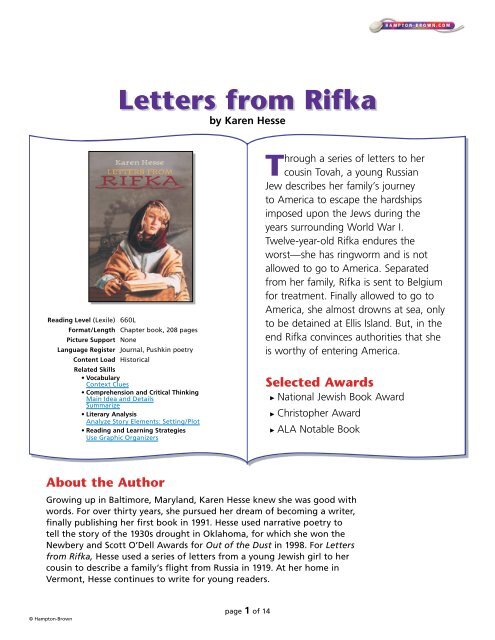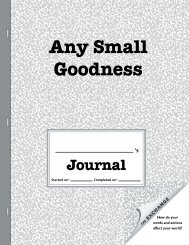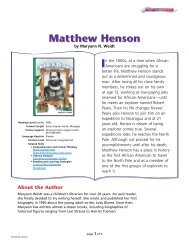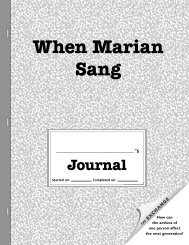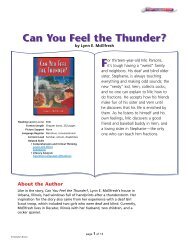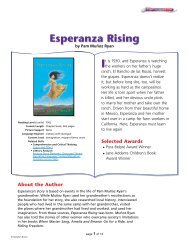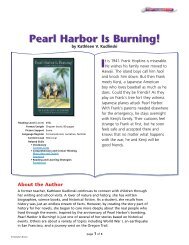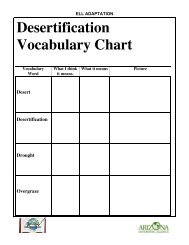You also want an ePaper? Increase the reach of your titles
YUMPU automatically turns print PDFs into web optimized ePapers that Google loves.
<strong>Letters</strong> <strong>from</strong> <strong>Rifka</strong><br />
by Karen Hesse<br />
Reading Level (Lexile)<br />
660L<br />
Format/Length Chapter book, 208 pages<br />
Picture Support None<br />
Language Register Journal, Pushkin poetry<br />
Content Load<br />
Historical<br />
Related Skills<br />
• Vocabulary<br />
Context Clues<br />
• Comprehension and Critical Thinking<br />
Main Idea and Details<br />
Summarize<br />
• Literary Analysis<br />
Analyze Story Elements: Setting/Plot<br />
• Reading and Learning Strategies<br />
Use Graphic Organizers<br />
Through a series of letters to her<br />
cousin Tovah, a young Russian<br />
Jew describes her family’s journey<br />
to America to escape the hardships<br />
imposed upon the Jews during the<br />
years surrounding World War I.<br />
Twelve-year-old <strong>Rifka</strong> endures the<br />
worst—she has ringworm and is not<br />
allowed to go to America. Separated<br />
<strong>from</strong> her family, <strong>Rifka</strong> is sent to Belgium<br />
for treatment. Finally allowed to go to<br />
America, she almost drowns at sea, only<br />
to be detained at Ellis Island. But, in the<br />
end <strong>Rifka</strong> convinces authorities that she<br />
is worthy of entering America.<br />
Selected Awards<br />
National Jewish Book Award<br />
Christopher Award<br />
ALA Notable Book<br />
About the Author<br />
Growing up in Baltimore, Maryland, Karen Hesse knew she was good with<br />
words. For over thirty years, she pursued her dream of becoming a writer,<br />
finally publishing her first book in 1991. Hesse used narrative poetry to<br />
tell the story of the 1930s drought in Oklahoma, for which she won the<br />
Newbery and Scott O’Dell Awards for Out of the Dust in 1998. For <strong>Letters</strong><br />
<strong>from</strong> <strong>Rifka</strong>, Hesse used a series of letters <strong>from</strong> a young Jewish girl to her<br />
cousin to describe a family’s flight <strong>from</strong> Russia in 1919. At her home in<br />
Vermont, Hesse continues to write for young readers.<br />
© Hampton-Brown<br />
page 1 of 14
<strong>Letters</strong> <strong>from</strong> <strong>Rifka</strong><br />
Think About What You Know<br />
Hardships This book is based on the real-life experiences of<br />
the author’s great aunt and her migration <strong>from</strong> Russia to<br />
America. To help students understand the hardships faced by<br />
immigrants coming to America, read aloud the historical note on<br />
pages 204–206.<br />
• Summarize: During the 1900s, Russian families couldn’t live<br />
the way they wanted to, so they left their homes to find a<br />
better life in America. The journey to America wasn’t easy.<br />
Families had to travel long distances by foot or by train,<br />
pass through unfamiliar countries, and cross the ocean.<br />
• Next, have students brainstorm hardships the immigrants<br />
might have faced. Prompt with questions: What did the<br />
people do with their personal belongings? How did they<br />
communicate with others? Did they know where to get<br />
food? Where did they stay? What if someone got sick?<br />
• Then have students use Student Journal, page 3 to describe<br />
what they think the immigrants were like.<br />
Preview and Predict<br />
Have students look at the front cover, read the title, and<br />
then read the summary on the back cover. Say:<br />
• This book is historical fiction. Although <strong>Rifka</strong> is a<br />
made-up character, her experiences are based on<br />
real events. What happened to <strong>Rifka</strong>? What kind of<br />
person do you think she was?<br />
Then point out The Exchange question on the title page:<br />
What is the best way to survive hard times? Explain that<br />
when they finish reading, they’ll share their ideas about<br />
this and other questions with a group.<br />
Next, have students complete Student Journal, page 3<br />
to preview the book and make predictions about what<br />
<strong>Rifka</strong> writes about in her letters.<br />
Prepare to Read<br />
Think About What You Know<br />
Student Journal, page 3<br />
Think about the hardships immigrants faced on their way to America. What<br />
kind of people were they? What words would you use to describe them?<br />
___________________________________________________________________________________<br />
___________________________________________________________________________________<br />
___________________________________________________________________________________<br />
___________________________________________________________________________________<br />
Preview and Predict<br />
• Look at the front cover.<br />
• Read the book summary on the back cover.<br />
• Read The Exchange question on the title page.<br />
• Read the Author’s Note on page 5.<br />
1. Who was the author’s inspiration for this book? Was the person an<br />
immigrant?<br />
________________________________________________________________________________<br />
________________________________________________________________________________<br />
________________________________________________________________________________<br />
2. What experiences do you think <strong>Rifka</strong> will share with her cousin?<br />
________________________________________________________________________________<br />
________________________________________________________________________________<br />
________________________________________________________________________________<br />
© Hampton-Brown<br />
page 2 of 14<br />
HP_LL_SJ_B1_3.indd 3<br />
6/16/05 5:50:32 PM
<strong>Letters</strong> <strong>from</strong> <strong>Rifka</strong><br />
Use a Reading Strategy<br />
Problem and Solution Chart Preview the graphic organizer<br />
on Student Journal, page 4 with students. Explain that as they<br />
read <strong>Letters</strong> <strong>from</strong> <strong>Rifka</strong>, they can complete the Problem and<br />
Solution Chart to show how <strong>Rifka</strong> solves her problems and gets to<br />
America. Have students add to their Problem and Solution Charts<br />
after they finish reading each section.<br />
Student Journal, page 4<br />
Use a Reading Strategy<br />
Use a Problem and Solution Chart<br />
As you read <strong>Letters</strong> <strong>from</strong> <strong>Rifka</strong>, use a Problem and Solution Chart to show how<br />
<strong>Rifka</strong>’s family solves their problem.<br />
Problem<br />
<strong>Rifka</strong> and her family had to leave Russia because they were Jewish. Jewish people were<br />
being persecuted by the government and non-Jews.<br />
Events<br />
Guards searched for <strong>Rifka</strong>’s brother. <strong>Rifka</strong> distracted them.<br />
The family got sick in Poland. Saul and <strong>Rifka</strong> were alone.<br />
<strong>Rifka</strong>’s family got better and went to Warsaw. <strong>Rifka</strong> couldn’t leave for America.<br />
<strong>Rifka</strong> got ringworm. She went to Belgium to get cured. Her family went to America<br />
without her.<br />
<strong>Rifka</strong> was cured. She began her trip to America. She made friends with a sailor.<br />
A storm wrecked the ship. Pieter saved <strong>Rifka</strong>, but he died. The ship was towed to Ellis Island.<br />
<strong>Rifka</strong> couldn’t enter America because she had no hair. She met Ilya and helped him.<br />
Her brother visited.<br />
Mama visited. <strong>Rifka</strong> decided she couldn’t go back to Russia.<br />
Solution<br />
<strong>Rifka</strong> used her writing and talking skills to get released <strong>from</strong> Ellis Island and finally joined<br />
her family in their new life in America.<br />
© Hampton-Brown<br />
HP_LL_SJ_B1_3.indd 4<br />
page 3 of 14<br />
6/26/05 3:08:45 PM
<strong>Letters</strong> <strong>from</strong> <strong>Rifka</strong><br />
Read the Book<br />
Form the group that will read <strong>Letters</strong> <strong>from</strong> <strong>Rifka</strong>. Plan how the<br />
group will read and respond. Some options are:<br />
• Read with a Group Group members read an agreed-upon<br />
number of pages, complete the corresponding Student Journal<br />
page(s), and meet to discuss. When they finish the book, they<br />
will meet again for The Exchange. The group can use the<br />
planner on Student Journal, page 2 to establish meeting times.<br />
• Read Independently Group members read the book on<br />
their own and then meet for The Exchange. The group can<br />
use the planner on Student Journal, page 2 to establish the<br />
meeting time.<br />
• <strong>Guide</strong>d Reading Read aloud the summary at the beginning<br />
of each letter to give students an overview of the letter. Use<br />
the Before You Move On questions to check comprehension<br />
as students read. Use Look Ahead to set a focus for reading<br />
the next set of pages. At the end of each section, assign the<br />
appropriate Student Journal page. Discuss the page before<br />
starting the next section. Establish a date for The Exchange<br />
and record it on the planner.<br />
Whichever option you choose, use pages 5– 13 for an at-a-glance<br />
view of Student Journal pages, as well as answers to the<br />
Before You Move On questions.<br />
Plan Your Schedule<br />
Student Journal, page 2<br />
My group members are: ___________________________________________________________<br />
___________________________________________________________________________________<br />
We plan to read <strong>Letters</strong> <strong>from</strong> <strong>Rifka</strong> and meet on these dates:<br />
Sections Date We Will Finish Reading Date We Will Discuss<br />
1. pages 5–27<br />
2. pages 28–51<br />
3. pages 52–75<br />
4. pages 76–103<br />
5. pages 104–117<br />
6. pages 118–131<br />
7. pages 132–159<br />
8. pages 160–179<br />
9. pages 180–206<br />
Our Exchange meeting will be on this date: .<br />
© Hampton-Brown<br />
page 4 of 14<br />
HP_LL_SJ_B1_3.indd 2<br />
7/29/05 3:41:33 PM
<strong>Letters</strong> <strong>from</strong> <strong>Rifka</strong><br />
Pages 5–27<br />
Section 1<br />
ANSWERS TO “BEFORE YOU MOVE ON”<br />
PAGE 6<br />
1. Author’s Purpose Why did the author call Aunt Lucy?<br />
Because she might have more information about her family’s<br />
migration to the United States.<br />
2. Genre This story is based on fact, but it is fiction. How do<br />
you know?<br />
The author explains that she changed names and certain details<br />
<strong>from</strong> the true story.<br />
PAGE 13<br />
1. Narrator <strong>Rifka</strong> is telling this story. How does she tell<br />
the story?<br />
<strong>Rifka</strong> is writing letters to her cousin, Tovah.<br />
2. Conflict <strong>Rifka</strong>’s brother Nathan tried to leave the Russian<br />
Army. Why did this cause the family to leave Russia?<br />
Jewish deserters were killed in front of the regiment as a warning.<br />
The family wanted to save Nathan.<br />
PAGE 27<br />
1. Plot How did <strong>Rifka</strong> save her family <strong>from</strong> the guards? Who<br />
else helped? How?<br />
She talked to them so they were unable to search the train. Uncle<br />
Avrum helped by telling the guards to come help him with a thief in<br />
his factory.<br />
2. Character Why was <strong>Rifka</strong> chosen to distract the guards?<br />
She looked like a Russian peasant, not Jewish. She spoke Russian<br />
without a Yiddish accent, and she was a good talker.<br />
HP_LL_SJ_B1_3.indd 5<br />
Section 1: Pages 5–27<br />
Respond to Pages 5–27<br />
Student Journal, page 5<br />
Problem and Solution Chart<br />
Review what happened in the first letter. Fill in the Problem and first event<br />
in the Chart on Journal page 4.<br />
Think It Over<br />
Think about what you have read so far and answer these questions.<br />
1. Personal Response <strong>Rifka</strong> had to leave her family and friends in Russia.<br />
Think of a time you left a person or place. Write about it below.<br />
________________________________________________________________________________<br />
________________________________________________________________________________<br />
________________________________________________________________________________<br />
2. Perspectives If Tovah read this letter, what do you think she would write<br />
to <strong>Rifka</strong>? Write a short response below.<br />
________________________________________________________________________________<br />
________________________________________________________________________________<br />
________________________________________________________________________________<br />
3. Summarize Describe what happened to <strong>Rifka</strong>’s family before the train left<br />
for Poland.<br />
<strong>Rifka</strong>’s family got ready to go to Russia. They hid at Uncle<br />
Avrum’s. They snuck on the train.<br />
________________________________________________________________________________<br />
________________________________________________________________________________<br />
6/16/05 10:18:40 AM<br />
© Hampton-Brown<br />
page 5 of 14
<strong>Letters</strong> <strong>from</strong> <strong>Rifka</strong><br />
Pages 28–51<br />
Section 2<br />
ANSWERS TO “BEFORE YOU MOVE ON”<br />
PAGE 34<br />
1. Conclusions Reread page 32. Why did the doctor examine<br />
the people?<br />
The Polish people didn’t want sick people to come into their country<br />
and spread disease.<br />
2. Character What shows you that <strong>Rifka</strong> was angry about how<br />
she and her family were treated?<br />
She questioned why Russians would steal their things and why Poles<br />
would humiliate them with naked exams at the train station.<br />
PAGE 41<br />
1. Cause and Effect Why did <strong>Rifka</strong>’s family have to stay<br />
in Poland?<br />
<strong>Rifka</strong> got typhus and gave it to everyone in her family but Saul.<br />
2. Inference Reread page 38. Why did the medical student say<br />
the family should not tell anyone about the typhus?<br />
They would probably be sent back to Russia if anyone knew <strong>Rifka</strong><br />
had typhus, because she could contaminate other people.<br />
PAGE 51<br />
1. Character’s Motive <strong>Rifka</strong> saved her food for Saul. Why?<br />
Reread pages 43–44.<br />
She wanted to save her food for him because he worked to support<br />
both of them.<br />
2. Flashback Reread pages 49–50. <strong>Rifka</strong> remembers her life in<br />
Berdichev. What was her life like there?<br />
There was no freedom and her family didn’t have much. She<br />
weighed more.<br />
HP_LL_SJ_B1_3.indd 6<br />
Section 2: Pages 28–51<br />
Respond to Pages 28–51<br />
Problem and Solution Chart<br />
Student Journal, page 6<br />
Add the events that you read about to your Problem and Solution Chart on<br />
Journal page 4.<br />
Think It Over<br />
Write answers to these questions.<br />
1. Personal Response Saul and <strong>Rifka</strong> were alone in Poland. Saul found a job<br />
so he and <strong>Rifka</strong> could survive. Write about a time you had to do<br />
something important for yourself or someone else.<br />
________________________________________________________________________________<br />
________________________________________________________________________________<br />
________________________________________________________________________________<br />
2. Setting Why did <strong>Rifka</strong> write that Russia was not as bad for Tovah’s family<br />
as it was for her family? How can one place be different for different<br />
people?<br />
Tovah’s family had more money and influence than<br />
<strong>Rifka</strong>’s family, so Russia was not as bad for them.<br />
Because they had money, Tovah’s family was not<br />
treated as badly.<br />
________________________________________________________________________________<br />
________________________________________________________________________________<br />
________________________________________________________________________________<br />
3. Character’s Point of View <strong>Rifka</strong> lived with Saul when her parents were in<br />
the hospital. How did her feelings about Saul change?<br />
She didn’t like Saul because he teased her. But she<br />
began to respect him when he got a job to provide<br />
food and shared it equally with her.<br />
________________________________________________________________________________<br />
________________________________________________________________________________<br />
________________________________________________________________________________<br />
6/16/05 5:41:05 PM<br />
© Hampton-Brown<br />
page 6 of 14
<strong>Letters</strong> <strong>from</strong> <strong>Rifka</strong><br />
Pages 52–75<br />
Section 3<br />
ANSWERS TO “BEFORE YOU MOVE ON”<br />
PAGE 62<br />
1. Comparisons Reread pages 58–59. Compare how <strong>Rifka</strong> and<br />
the Polish girl she met felt about going to America.<br />
<strong>Rifka</strong> was excited and said she would do everything there. The Polish<br />
girl didn’t understand why anyone would leave home.<br />
2. Character’s Motive Reread pages 60–61. Why did <strong>Rifka</strong> ask<br />
her mother if she could get off the train?<br />
She wanted to find a quiet corner where she could open her Pushkin<br />
book. She knew her mother didn’t like Pushkin.<br />
PAGE 70<br />
1. Conflict Why did the doctor say <strong>Rifka</strong> could not have a<br />
steamship ticket?<br />
She had ringworm and would not be allowed to enter the<br />
United States.<br />
2. Conclusions Reread pages 68–70. Why did <strong>Rifka</strong> think<br />
Warsaw was a very bad place?<br />
An old man charged her too much money for an orange and called<br />
her a thief. Warsaw was big and had cars, which she had not<br />
seen before.<br />
PAGE 75<br />
1. Paraphrase Reread pages 72–75. Tell why <strong>Rifka</strong> had to go to<br />
Belgium and why her mother could not stay with her.<br />
<strong>Rifka</strong> had to go to Belgium to get cured <strong>from</strong> ringworm. Her mother<br />
would not be able to earn money for the family in Europe. If her<br />
mother stayed, she would cost the family money.<br />
2. Cause and Effect Reread page 75. What would happen if<br />
<strong>Rifka</strong> returned to Berdichev?<br />
The Russians would kill her. They might punish the rest of her family<br />
that lived there.<br />
Section 3: Pages 52–75<br />
Respond to Pages 52–75<br />
Student Journal, page 7<br />
Problem and Solution Chart<br />
Review what has happened so far. Add events to your Problem and Solution<br />
Chart on Journal page 4.<br />
Think It Over<br />
Write answers to these questions.<br />
1. Personal Response In Warsaw, <strong>Rifka</strong> ate an orange for the first time.<br />
Write about some foods you tried for the first time. How did you feel<br />
before you ate the food? Did you like what you ate? Why or why not?<br />
2. Context Clues On page 72, <strong>Rifka</strong> said she had a “bald patch” on her head.<br />
What tells you that “bald patch” means “no hair”?<br />
“hair is falling out”<br />
“can cover it with a kerchief”<br />
“I must be ugly”<br />
3. Judgments <strong>Rifka</strong>’s family sent her to Antwerp alone because she had<br />
ringworm. Do you think this was a good decision? Why or why not?<br />
HP_LL_SJ_B1_3.indd 7 6/27/05 8:15:22 PM<br />
© Hampton-Brown<br />
page 7 of 14
<strong>Letters</strong> <strong>from</strong> <strong>Rifka</strong><br />
Pages 76–103<br />
Section 4<br />
ANSWERS TO “BEFORE YOU MOVE ON”<br />
PAGE 89<br />
1. Character <strong>Rifka</strong> loved her new home but said it could never<br />
be home without her mama and papa. What did this show<br />
about <strong>Rifka</strong>?<br />
The love of her family is more important than material things.<br />
2. Conclusions Reread pages 85–86. Why was <strong>Rifka</strong> afraid to<br />
play with the children in the park?<br />
She was afraid they would hate her because she was Jewish and<br />
had no hair.<br />
PAGE 96<br />
1. Cause and Effect <strong>Rifka</strong> got lost. Reread page 91. What<br />
caused <strong>Rifka</strong> to lose her way?<br />
She took a different route and then ran <strong>from</strong> a giant man who<br />
smiled at her with gold teeth and scared her.<br />
2. Conclusions Reread pages 92–94. Why did <strong>Rifka</strong> trust<br />
the milkman?<br />
He reminded her of Uncle Zeb and Uncle Zeb would have helped a<br />
child. She was told she could trust people in Antwerp because they<br />
did not hate Jews like in Russia.<br />
PAGE 103<br />
1. Character <strong>Rifka</strong> became friends with the children she used<br />
to watch at the park. How else have her feelings about<br />
Belgium changed?<br />
She felt comfortable, and she loved Antwerp. People<br />
seemed familiar.<br />
2. Character’s Motive Reread pages 102–103. Why did <strong>Rifka</strong><br />
want to learn to make ice cream?<br />
She wanted to share her knowledge with her Russian relatives so<br />
they could become rich.<br />
HP_LL_SJ_B1_3.indd 8<br />
Section 4: Pages 76–103<br />
Respond to Pages 76 –103<br />
Problem and Solution Chart<br />
Student Journal, page 8<br />
Add events to your Chart on Journal page 4 that show what happened on<br />
pages 76–103.<br />
Think It Over<br />
Think about what you have read so far and answer these questions.<br />
1. Personal Response If you were <strong>Rifka</strong>, would you explore a big city like<br />
Antwerp? Why or why not?<br />
________________________________________________________________________________<br />
________________________________________________________________________________<br />
________________________________________________________________________________<br />
2. Context Clues On page 88, <strong>Rifka</strong> asked her mother if Uncle Avrum<br />
wanted Tovah to find a husband. What did <strong>Rifka</strong>’s mother mean when<br />
she said “some girls aren’t meant to marry”?<br />
She meant that men would probably not be interested<br />
in Tovah.<br />
________________________________________________________________________________<br />
________________________________________________________________________________<br />
________________________________________________________________________________<br />
3. Setting At first <strong>Rifka</strong> said she would go back to Berdichev rather than<br />
go to Antwerp. But then she liked Antwerp. How were Antwerp and<br />
Berdichev similar and different? Do you think <strong>Rifka</strong> was happy about<br />
her decision to go to Antwerp? Why?<br />
Antwerp and Berdichev both felt like home for <strong>Rifka</strong>.<br />
She knew and liked people in both places.<br />
________________________________________________________________________________<br />
________________________________________________________________________________<br />
________________________________________________________________________________<br />
6/16/05 10:18:41 AM<br />
© Hampton-Brown<br />
page 8 of 14
<strong>Letters</strong> <strong>from</strong> <strong>Rifka</strong><br />
Pages 104–117<br />
Section 5<br />
ANSWERS TO “BEFORE YOU MOVE ON”<br />
PAGE 109<br />
1. Conclusions Reread page 104. Why did the doctor sign<br />
<strong>Rifka</strong>’s papers?<br />
To say her ringworm was cured and she could go to America.<br />
2. Paraphrase Reread page 107. Use your own words to tell why<br />
Pushkin and her letters were important to <strong>Rifka</strong>.<br />
Pushkin reminds <strong>Rifka</strong> of Russia. The memories she writes in her<br />
Pushkin book help her remember her own past.<br />
PAGE 117<br />
1. Conclusions Reread page 112. Why did <strong>Rifka</strong> sometimes pinch<br />
herself when Pieter was around?<br />
She wanted to make sure she was not dreaming. She couldn’t<br />
believe how nicely he treated her.<br />
2. Inference Reread page 116. Why do you think Pieter quickly<br />
left after he kissed <strong>Rifka</strong>?<br />
He was embarrassed after the kiss.<br />
Section 5: Pages 104–117<br />
Respond to Pages 104 –117<br />
Student Journal, page 9<br />
Problem and Solution Chart<br />
Add events to your Chart on Journal page 4 to show what happens on<br />
pages 104–117.<br />
Think It Over<br />
Write answers to these questions.<br />
1. Personal Response <strong>Rifka</strong> was excited that she was going to America.<br />
Write about a time you went someplace new. How did you feel about<br />
going there?<br />
________________________________________________________________________________<br />
________________________________________________________________________________<br />
________________________________________________________________________________<br />
2. Character Pieter and others told <strong>Rifka</strong> she was smart, but <strong>Rifka</strong> was not<br />
sure. Look back in the story. What did <strong>Rifka</strong> do that shows she is smart?<br />
She distracted the guards. She wrote well. She talked to<br />
everyone. She survived on her own.<br />
________________________________________________________________________________<br />
________________________________________________________________________________<br />
________________________________________________________________________________<br />
3. Character’s Point of View <strong>Rifka</strong> planned to write poems in America.<br />
What inspired her? Do you think this was a good plan? Why or why not?<br />
Pushkin inspired her. This was a good plan because <strong>Rifka</strong><br />
was a good writer and had the motivation of wanting to<br />
record her memories.<br />
________________________________________________________________________________<br />
________________________________________________________________________________<br />
________________________________________________________________________________<br />
HP_LL_SJ_B1_3.indd 9<br />
6/16/05 10:18:41 AM<br />
© Hampton-Brown<br />
page 9 of 14
<strong>Letters</strong> <strong>from</strong> <strong>Rifka</strong><br />
Pages 118–131<br />
Section 6<br />
ANSWERS TO “BEFORE YOU MOVE ON”<br />
PAGE 127<br />
1. Character Reread pages 124–125. <strong>Rifka</strong> heard that Pieter died<br />
in the storm. Why did <strong>Rifka</strong> cry for Pieter and for herself?<br />
She cried for Pieter because she learned Pieter went overboard.<br />
She cried for herself because she had many difficult things happen<br />
to her and had not cried.<br />
2. Summarize Reread page 126. What did <strong>Rifka</strong> learn<br />
about life?<br />
That it is precious and short. People are defenseless and can’t<br />
control things.<br />
PAGE 131<br />
1. Context Clues Reread page 129. The ship arrived at Ellis<br />
Island. <strong>Rifka</strong>’s papa wrote: “at Ellis Island you are neither in<br />
nor out of America.” What does this mean?<br />
It means that until you are off Ellis Island, you are not yet<br />
considered an American and can’t enjoy life as a citizen.<br />
2. Comparisons How have <strong>Rifka</strong>’s feelings changed <strong>from</strong> the<br />
last letter?<br />
She was miserable and tired and wanted to go back to<br />
Berdichev. Now she is excited to see her family and make<br />
a new life in America.<br />
HP_LL_SJ_B1_3.indd 10<br />
Section 6: Pages 118–131<br />
Respond to Pages 118 –131<br />
Problem and Solution Chart<br />
Student Journal, page 10<br />
Add the events that <strong>Rifka</strong> wrote about on pages 118–131 to your Chart on<br />
Journal page 4.<br />
Think It Over<br />
Think about what you have read so far and answer these questions.<br />
1. Personal Response On page 127 <strong>Rifka</strong> said she was tired <strong>from</strong> her<br />
traveling and wished she never left Berdichev. Tell about a time you<br />
wanted to give up. Why did you continue?<br />
________________________________________________________________________________<br />
________________________________________________________________________________<br />
________________________________________________________________________________<br />
2. Metaphor <strong>Rifka</strong> compared her fear of the storm to her fear of the<br />
pogroms in Russia. How were they similar?<br />
She felt terror, she was scared she would die, there was<br />
confusion, she was being attacked either by people or<br />
waves, and she felt defenseless.<br />
________________________________________________________________________________<br />
________________________________________________________________________________<br />
________________________________________________________________________________<br />
3. Paraphrase <strong>Rifka</strong> decided that she wanted America to be more than a<br />
place to run to. She wanted to make a new life there. She said, “life is as<br />
good as a clever girl can make it.” What did she mean?<br />
She meant if a person is smart and works hard, they<br />
could have a good life. She felt this way about America<br />
and knew she would enjoy living there.<br />
________________________________________________________________________________<br />
________________________________________________________________________________<br />
________________________________________________________________________________<br />
6/16/05 10:18:41 AM<br />
© Hampton-Brown<br />
page 10 of 14
<strong>Letters</strong> <strong>from</strong> <strong>Rifka</strong><br />
Pages 132–159<br />
Section 7<br />
ANSWERS TO “BEFORE YOU MOVE ON”<br />
PAGE 138<br />
1. Conclusions Reread page 134. What did the chalk mark on<br />
<strong>Rifka</strong>’s shoulder mean? How do you know?<br />
It meant she was not yet able to go to America and had to stay<br />
with the detainees.<br />
2. Cause and Effect Reread pages 136–137. The American<br />
government did not want a woman without hair to come to<br />
America. Why?<br />
Without hair, a woman wouldn’t find a husband to take care of<br />
her so the government would be responsible for her.<br />
PAGE 147<br />
1. Character’s Motive Reread pages 146–147. <strong>Rifka</strong> met a<br />
Russian peasant. At home he was the enemy. Why did she talk<br />
to him anyway?<br />
She felt sorry for him because he was a scared little boy who was<br />
starving himself and it felt good to help him.<br />
2. Cause and Effect Why wasn’t Ilya eating?<br />
He wanted to go back to Russia and thought they would send him<br />
back if he was sick.<br />
PAGE 159<br />
1. Inference Reread pages 149–150. Saul visited <strong>Rifka</strong>. Why do<br />
you think Saul backed away and looked down at <strong>Rifka</strong>?<br />
He was surprised at how she had changed, that she had no hair<br />
and was thinner.<br />
2. Conclusions Reread pages 151–152. Why didn’t Saul talk to<br />
the doctor?<br />
He couldn’t speak English very well.<br />
HP_LL_SJ_B1_3.indd 11<br />
Section 7: Pages 132–159<br />
Respond to Pages 132–159<br />
Problem and Solution Chart<br />
Add the events you read about in the letters on pages 132–159 to your<br />
Problem and Solution Chart on Journal page 4.<br />
Think It Over<br />
Student Journal, page 11<br />
Think about what you have read so far and answer these questions.<br />
1. Personal Response When <strong>Rifka</strong> met Ilya she hated him but also felt sorry<br />
for him. Tell about a time you had conflicting feelings. What did you do?<br />
________________________________________________________________________________<br />
________________________________________________________________________________<br />
________________________________________________________________________________<br />
2. Perspectives It was hard for <strong>Rifka</strong> to make friends with Ilya. Write about<br />
when <strong>Rifka</strong> and Ilya met <strong>from</strong> Ilya’s point of view.<br />
________________________________________________________________________________<br />
________________________________________________________________________________<br />
________________________________________________________________________________<br />
3. Character <strong>Rifka</strong>’s Star of David fell out of her book and broke. Why was<br />
it so important to her?<br />
It was important to her because it was a symbol of her<br />
faith and of a time she was able to survive on her own.<br />
It had given her strength through difficult times.<br />
________________________________________________________________________________<br />
________________________________________________________________________________<br />
________________________________________________________________________________<br />
6/16/05 10:18:41 AM<br />
© Hampton-Brown<br />
page 11 of 14
<strong>Letters</strong> <strong>from</strong> <strong>Rifka</strong><br />
Pages 160–179<br />
Section 8<br />
ANSWERS TO “BEFORE YOU MOVE ON”<br />
PAGE 169<br />
1. Simile On page 160, <strong>Rifka</strong>’s mother visited. <strong>Rifka</strong> said her<br />
heart would break open like an egg. Why did she make<br />
this comparison?<br />
She felt fragile like a thin eggshell, like she could easily break open<br />
because she was so full of love for her mother.<br />
2. Inference Reread page 167. Even though we never hear<br />
Tovah, how does she help <strong>Rifka</strong>?<br />
<strong>Rifka</strong> poses problems to Tovah in her letters and then imagines<br />
what Tovah would tell her. <strong>Rifka</strong> solves her problems this way.<br />
PAGE 179<br />
1. Character’s Motive Why was <strong>Rifka</strong> angry at Ilya for wasting<br />
toilet paper?<br />
In Russia it was a crime to waste paper. She was scared they would<br />
be killed or punished.<br />
2. Inference <strong>Rifka</strong>’s head started itching. How did she feel<br />
about this? Why?<br />
She was afraid that maybe she had ringworm again. If she had<br />
ringworm, she could not enter America.<br />
HP_LL_SJ_B1_3.indd 12<br />
Section 8: Pages 160–179<br />
Respond to Pages 160 –179<br />
Problem and Solution Chart<br />
Review what you read. Add to your Problem and Solution Chart on<br />
Journal page 4.<br />
Think It Over<br />
Student Journal, page 12<br />
Write the answers to these questions.<br />
1. Personal Response <strong>Rifka</strong> yelled at Ilya for wasting paper. Later, she<br />
thought it was funny. Write about a time something bad happened to<br />
you that you later thought was funny.<br />
________________________________________________________________________________<br />
________________________________________________________________________________<br />
________________________________________________________________________________<br />
2. Setting On page 179 <strong>Rifka</strong> wrote that she could not go back to Berdichev<br />
after living in “this big world.” What did she mean by “this big world”?<br />
Why did she say she could not go back?<br />
<strong>Rifka</strong> would miss her family if she went back to Russia.<br />
Also, she would not be able to explore new places.<br />
________________________________________________________________________________<br />
________________________________________________________________________________<br />
________________________________________________________________________________<br />
3. Character’s Point of View <strong>Rifka</strong> wrote that she was both Jewish and<br />
Russian. How did this make her feel different <strong>from</strong> her family?<br />
Her family members did not think of themselves<br />
as Russian. This was because they had many bad<br />
experiences with Russian peasants.<br />
________________________________________________________________________________<br />
________________________________________________________________________________<br />
6/16/05 10:18:41 AM<br />
© Hampton-Brown<br />
page 12 of 14
<strong>Letters</strong> <strong>from</strong> <strong>Rifka</strong><br />
Pages 180–206<br />
Section 9<br />
ANSWERS TO “BEFORE YOU MOVE ON”<br />
PAGE 190<br />
1. Summarize Reread pages 184–186. Why did Mr. Fargate<br />
almost send Ilya back to Russia?<br />
He thought he was not smart and Ilya would not speak.<br />
2. Cause and Effect What happened that made Ilya read?<br />
<strong>Rifka</strong> begged Ilya’s uncle to talk to him. His uncle said he wanted<br />
him and wanted to give him a better life. His uncle came over and<br />
asked him to read. Ilya began to read.<br />
PAGE 203<br />
1. Plot Reread pages 192–193. What lesson did <strong>Rifka</strong> learn?<br />
to depend on being clever, not her looks<br />
2. Character How did <strong>Rifka</strong> use the lesson to convince<br />
Mr. Fargate that she didn’t need hair?<br />
She told him all the ways she was smart, that she would marry for<br />
love, and that she had talent in writing. She proved that talent by<br />
reading one of her poems.<br />
PAGE 206<br />
1. Author’s Purpose Why did the author include a<br />
historical note?<br />
to show readers that the events in the story were based on real life;<br />
to make readers aware of history<br />
2. Summarize Why was life so difficult for Jewish people in the<br />
years around World War I?<br />
People were angry at them and many of them were killed. They<br />
were not free and could not own property.<br />
HP_LL_SJ_B1_3.indd 13<br />
Section 9: Pages 180–206<br />
Respond to Pages 180 –206<br />
Problem and Solution Chart<br />
Complete the Solution box on your Chart on Journal page 4.<br />
Think It Over<br />
Student Journal, page 13<br />
Think about what you have read so far and answer these questions.<br />
1. Personal Response Throughout the story, we hear that <strong>Rifka</strong> talked too<br />
much. Sometimes it got her in trouble. Sometimes it saved her. Tell about<br />
a trait you have that has helped you through hard times.<br />
________________________________________________________________________________<br />
________________________________________________________________________________<br />
________________________________________________________________________________<br />
2. Character Ilya surprised everyone when he started to talk. How did Ilya<br />
change <strong>from</strong> when <strong>Rifka</strong> first met him?<br />
At first, Ilya did not want to come to America. He would<br />
only talk to <strong>Rifka</strong>. Later, he wanted to live with his<br />
uncle. He talked to Mr. Fargate.<br />
________________________________________________________________________________<br />
________________________________________________________________________________<br />
________________________________________________________________________________<br />
3. Author’s Point of View What can you tell about the author <strong>from</strong> the<br />
Historical Note?<br />
That she really admired the people who left their<br />
homelands and the persecution there in search of a<br />
better life.<br />
________________________________________________________________________________<br />
________________________________________________________________________________<br />
6/26/05 3:08:46 PM<br />
© Hampton-Brown<br />
page 13 of 14
<strong>Letters</strong> <strong>from</strong> <strong>Rifka</strong><br />
Allow time for groups to meet for The Exchange. If you plan to participate, use<br />
these tips for guiding students in discussing the big question:<br />
What is the best way to survive hard times?<br />
How would <strong>Rifka</strong> answer this question? Think of the many difficult events<br />
that happened on her trip to America.<br />
<strong>Rifka</strong> would say that writing to Tovah gave her strength to survive. She would also talk<br />
about how the love she had for her family and her dreams of a better life helped her<br />
overcome the many problems she had.<br />
There are many times <strong>Rifka</strong> feels like quitting her journey to America.<br />
Think of as many as you can. Then tell about a time you felt like quitting<br />
something. How did you keep going?<br />
<strong>Rifka</strong> wants to quit her journey when her family leaves her in Europe. She thinks of<br />
Berdichev before she gets on the boat to America. She cries when Pieter dies. She is also<br />
frustrated when she has to wait at Ellis Island.<br />
What if <strong>Rifka</strong> did not help Ilya? What do you think would happen to him?<br />
How important do you think it is to help others?<br />
Ilya would almost certainly die of hunger or be sent back to Russia if <strong>Rifka</strong> didn’t help him.<br />
Extend the Reading<br />
Write a Letter to <strong>Rifka</strong> Research Ellis Island Describe the Journey<br />
Have students imagine that<br />
Tovah has received <strong>Rifka</strong>’s<br />
letter <strong>from</strong> America and the<br />
book of Pushkin filled with<br />
her notes about the journey.<br />
Invite them to write back to<br />
<strong>Rifka</strong> as if they were Tovah,<br />
telling how she feels about<br />
<strong>Rifka</strong>’s journey and asking<br />
questions about America.<br />
Have small groups find out<br />
more about Ellis Island <strong>from</strong><br />
books, encyclopedias, or<br />
online. Have them choose<br />
downloaded photos or<br />
drawings to use for an<br />
exhibit, add captions, and<br />
display the exhibit in the<br />
classroom.<br />
Students can draw or trace<br />
<strong>Rifka</strong>’s journey on a map.<br />
Then they can present it to<br />
the class, tracing the route,<br />
giving the distances <strong>from</strong><br />
place to place, and using one<br />
or two summary statements<br />
to tell what happened during<br />
each leg of the journey.<br />
© Hampton-Brown<br />
page 14 of 14


